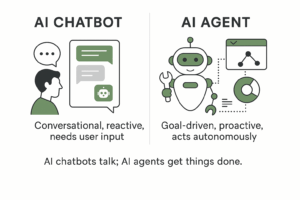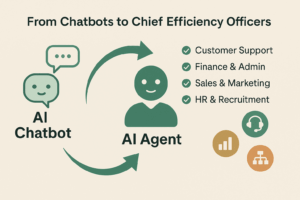What are AI Agents?
Think of an AI agent as a supercharged digital assistant. If you are a fervent ChatGPT user, you might think “I am already using ChatGPT as my personal assistant and that works just fine for me!”. If that’s you, keep reading, because you’re in for a surprise.
Let’s first explore the difference between AI Chatbots and AI Agents. There are a few key points that make all the difference between how those two operate and what you can gain from them. First, AI Chatbots are conversational. This might be obvious from the name but is a really important difference. Where AI Chatbots require constant user input to provide users with answers, AI Agents usually require a task or objective to get started. With their objective in (virtual) hand, they can actually do tasks autonomously.
You should think of AI Agents as the next iteration on task automation software like IFTT, Zapier or the Microsoft Power Platform, not so much as a new version of ChatGPT.
To summarize, AI Agents can:
- Observe what’s happening (by reading emails, checking data, or monitoring tasks)
- Decide what to do next (using AI to figure out the best move)
- Act independently (sending emails, updating records, booking meetings, and more)

Still sounds abstract?
Picture this: Instead of manually sorting your inbox every morning, imagine an AI agent that reads, categorizes, replies to routine messages, and flags only the important stuff for your attention. That’s not sci-fi; it’s already happening.
From Chatbots to Chief Efficiency Officers
Today’s AI agents are constantly becoming smarter, they learn from context, handle ambiguity, and even coordinate complex workflows. With the growing number of tool integrations, there is an increasing workload that can be handled by these agents.

Where are businesses already using AI agents?
- Customer Support: Agents can resolve tickets, answer common questions, and escalate tricky cases—all 24/7, with a friendly (digital) face.
- Finance & Admin: Processing invoices, flagging anomalies, prepping reports… the boring, repetitive stuff that soaks up valuable staff time.
- Sales & Marketing: Qualifying leads, personalizing outreach, following up automatically, or even running multistep campaigns across channels.
- HR & Recruitment: Screening CVs, scheduling interviews, handling candidate communications.
These agents aren’t here to completely “replace” your team, but to handle the repetitive grunt work, so your people can focus on what humans do best: creativity, relationship-building, and big-picture thinking.
Why Should You Care about AI Agents
Let’s get practical. Here’s what AI agents can do for you:
- AI Agents will simply save time on repetitive, rule-based tasks that eat up hours each week.
- Agents don’t get tired or distracted reducing potential errors or missed deadlines.
- Finding more people can be a big challenge in the currently tight labor market. Need to process 10x the volume? Agents don’t need overtime or vacation days so they can scale effortlessly.
Companies that are fast to adopt AI agents simply gain an edge. With the additional firepower of AI Agents, your teams can easily 10-20% more work done. In some cases the effects can even be stronger.
Getting Started: Tips Before You Dive In
- Start Small: Don’t try to automate everything at once. Pick one pain point, like invoice processing or customer FAQs, and pilot an AI agent there.
- Involve Your Team: AI works best when it’s augmenting people, not sidelining them. Get feedback, explain the benefits, and invite collaboration.
- Monitor & Improve: Track how well your agents perform. Most platforms offer analytics so use them! Tweak and expand as you go.
The Takeaway
AI agents aren’t a distant dream. They’re here, quietly reshaping how businesses work, sometimes in ways you barely notice. By understanding what they are (digital workers with a dash of smarts and a lot of hustle) and where they fit into your business, you can harness their power to save time, cut costs, and unlock new growth.
Curious to see what an AI agent could do for your team? You don’t have to be a tech giant to get started, just a little bit curious, and open to working smarter (not harder).
Ready to explore? We can help you set up your first AI team. Contact us!







